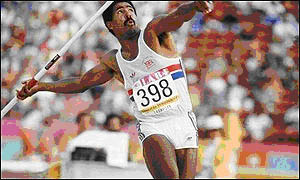Great Olympic Moments: Daley Thompson and the Decathlon, Los Angeles Olympics 1984
During the Beijing 2008 games you will witness your own favourite Olympic Moment, a performance or incident that will forever stick in the memory.
My Olympic Moment was watching British athlete Daley Thompson winning the gold medal for the decathlon.
The Decathlon
You may not be familiar with the decathlon. For sure, all Olympic events are admirable. The pole vault takes bravery, technique and a touch of madness. The marathon requires years of dedication, dieting and training, and it looks exhausting. But if just remembering or listing the ten events that make up the decathlon is a tiring challenge, imagine having to practice from an early age to become world-class at ten sports, train all year round to perfect each skill, and then compete in these ten disciplines over two demanding and grueling days.
Competing in the decathlon is the ultimate test in sport. It requires determination, stamina, perseverance, and guts. As Thompson once joked, “Being a decathlete is like having ten girlfriends. You have to love them all, and you can’t afford to lose one”.
He won two Olympic gold medals for the decathlon in 1980 and 1984, yet Daley Thompson is not just Britain’s greatest ever sportsman purely because of ability and success.
What Makes a Great Athlete?
Great athletes need to have genuine charisma and a personality that captivates spectators. More significantly, the style in which they conduct themselves and the way in which they compete should reflect their character. Daley Thompson had both qualities.
And to be truly great, a sportsperson needs an equally talented opponent with a contrasting character or style. The wit, charm, skill, and bravery of boxer Muhammad Ali are forever memorable because of his fight with the taciturn, brooding, and brutally dangerous George Foreman in 1974. The fiery perfectionism and startling ground shots of John McEnroe were brought out in his epic tennis matches against the measured play of the calm, considered Bjorn Borg in the early 1980s. Competitive rivalry creates drama. Having an equal adversary pushes great athletes to perform to their highest abilities, and sport becomes what it should be, which is a test and expression of human qualities.
For Daley Thompson, this rivalry was with Jurgen Hingsen.
Daley Thompson vs. Jurgen Hingsen

Both were equals in determination, preparation and skill but opposites in character and performance, and this contrast made compulsive viewing. Hingsen was thoughtful and focused on the track. Nicknamed the “German Hercules” because of his strength and height, his technique and movements were well studied and methodical. In contrast, Thompson was shorter, flamboyantly skillful and would adapt or change his techniques when necessary. He would cheekily joke to the cameras and show genuine emotional reactions to setbacks and infectious delight when he succeeded.
Throughout their years of rivalry, each time Hingsen claimed a new world record in the decathlon, Thompson would shatter it in the next tournament, and Hingsen never defeated the Briton in ten attempts. Although Hingsen was an excellent athlete and came close to winning gold, Thompson was stoical and simply refused to give in.
In some respects, Thompson was atypically British. He was supremely confident, cocky and outspoken. When Hingsen bragged that he would win the decathlon gold, Thompson commented “There are only two ways he is going to bring a gold medal home; he’ll have to steal mine or win another event”.
The decathlon in the summer of 1984 quickly became a personal battle between the irreverent Thompson and the reticent, calm Hingsen. Only 32 points separated them as they competed in the pole vault. The pole vault was never his favourite sport, and Thompson needed to clear the bar at 16ft. He took a risk and succeeded, moving into an unmatchable lead. His joy in celebrating with a back flip electrified the crowd and was one of the defining images of the 1984 Olympics.
Truly Great
In the 21st century, many so-called iconic professional sportsmen with nothing interesting or insightful to say value making money over the thrill of competition and try to fake charisma with a shocking hairstyle or unusual tattoo. The determination, self-sacrifice, genuine charisma and enjoyment of pure competition of athletes such as Daley Thompson, Muhammad Ali and McEnroe remind us of how we should judge what a legendary sportsperson is.
Making Memories
An Olympic Moment can be memorable because of its poignancy, such as when Ali lit the Olympic flame in Atlanta in 1996.
The moment can be socially significant, like when aboriginal athlete Cathy Freeman won a gold medal in the Sydney Olympics.
Or it can be something unexpected. When Daley Thompson received the gold medal in 1984 he didn’t react with false modesty, fake tears or ugly patriotism as the British national anthem played. He simply whistled along, relaxed in the knowledge he had done what every truly great athlete does, which is to both challenge and express yourself successfully in your chosen sport. And that, right there, became my Olympic Moment.
In the Olympics in Beijing this summer, one event, one sportsperson, one incident will provide you with a similar Olympic Moment. Enjoy the spectacle.
中文